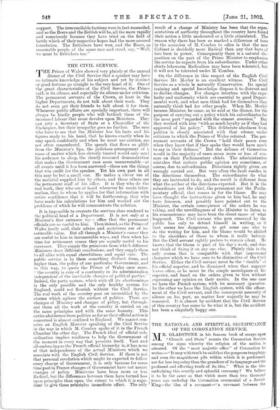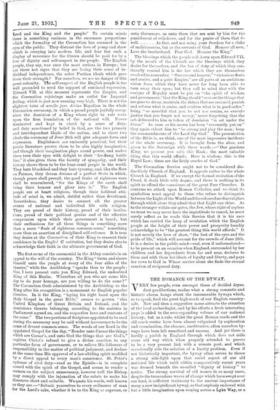attested. Of the "most majestic office" of Coronation he Lord
and the King and the people." To certain minds there is something ominous in the enormous proportions which the formality of the Coronation has assumed in the eyes of the public. They distrust the love of pomp and show which is creeping into modern life, and fear lest such a display of reverence for the Crown should be paid for by a loss of dignity and self-respect in the people. The English people. they say, was once the most serious in Europe ; but are there not signs that they are losing their sense of in- dividual independence, the sober Puritan ideals which gave them their strength ? For ourselves, we see no danger of this great calamity. The self-respect of the English people is too well grounded to need the support of continual expression. Edward VII. at this moment represents the Empire, and the Coronation rejoicings make an outlet for Imperial feeling, which is just now running very high. There is not the slightest taint of servile jars divine Royalism in the whole Coronation ceremony, in which a proud people joyfully recog- nises the dominion of a King whose right to rule rests upon the firm foundation of the national will. Power dominated and kept in check by a sense of duty, and duty sanctioned by belief in God, are the two primary and interdependent ideals of the nation, and to these two ideals the ceremony of June 26th will give adequate form and expression. Englishmen are eminently practical, but their poetic literature proves them to be also highly imaginative, and though their imagination plays round power, and makes them turn their eyes with delight to their " far-flung battle line it also gives them the faculty of sympathy, and their history shows them to be the least cruel people in the world. They hate bloodshed and they hate tyranny, and, like the Seer on Patmos, they dream dreams of a perfect State in which, though peace shall prevail, the good fruits of righteous wars shall be remembered, "for the Kings of the earth shall bring their honour and glory into it." The English people are at heart religious, though their habitual atti- tude of mind is, we admit, dutiful rather than devotional. Nevertheless, they desire to connect all the greater events of national and individual life with religion. They are proud of their history, proud of their institu- tions, proud of their political genius and of the effective compromise upon which their government is based ; but their enthusiasm for all these things is something more than a mere "flush of righteous common-sense," something more than an assertion of disciplined self-reliance. It is true they desire at the Coronation of their King to reassert their confidence in the Englisi C nstitution, but they desire also to acknowledge their faith in the ultimate government of God.
The first scene of the ceremonial in the Abbey consists in an appeal to the will of the country. The King" turns and shows himself unto the people at every of the four sides of the theatre," while the Archbishop "speaks thus to the people; Sirs, I here present unto you King Edward, the undoubted King of this Realm. Wherefore all you who are come this day to do your homage, are you willing to do the same " The Coronation Oath administered by the Archbishop to the King after his recognition is a monument to English popular liberties. In it the King, "laying his right hand upon the Holy Gospel in the great Bible," swears to govern "this United Kingdom of Great Britain and Ireland, and the dominions thereto belonging, according to the statutes in Parliament agreed on, and the respective laws and customs of the same." The two portions of Scripture appointed to be read during the ceremony may be said without irreverence to be the acme of devout common-sense. The words of our Lord in the appointed Gospel for the day, "Render unto Caesar the things which are Caesar's, and unto God the things that are God's," register Christ's refusal to give a divine sanction to any particular form of government, or to relieve His followers of responsibility in the matter of political judgment, and declare at the same time His approval of a law-abiding spirit modified by a direct appeal to every man's conscience. St. Peter's epitome of civil duty—read as the Epistle—is in complete accord with the spirit of the Gospel, and seems to render a sermon on the subject unnecessary, however well the Bishop may comply with the injunction of the rubric to make his discourse short and suitable. We quote his words, well known as they are :—" Submit yourselves to every ordinance of man for the Lord's sake, whether it be to the King as supreme, or
unto Governors, as unto them that are sent by him for the punishment of evil-doers, and for the praise of them that do
well As free, and not using your freedom for a cloke of maliciousness, but as the servants of God. Honour all men. • Love the brotherhood. Fear God. Honour the King."
The blessings which the people call down upon Edward VII. by the mouth of the Church are the blessings which they desire for themselves, and the law of duty of which they con- tinually remind him is the law which they are themselves resolved to remember. "Success and honour," "victorious fleets and armies, and a quiet Empire," are all parts of an ambitious vision from which they have never for long been able to turn away their eyes ; but they call to mind that with the ensigns of Royalty must be put on "the spirit of wisdom and government;' that the King should " restore the things that are gone to decay, maintain the things that are restored, punish and reform what is amiss, and confirm what is in good order," being "so merciful that you be not too remiss, so execute justice that you forget not mercy," never forgetting that the orb delivered to him in token of dominion "is set under the Cross." As soon as his crown has been "reverently put on" they again exhort him to "be strong and play the man ; keep the commandments of the Lord thy God." The presentation of the Bible is, we think, one of the most impressive incidents of the whole ceremony. It is brought from the altar, and given to the Sovereign with these words :—" Our gracious King. we present you with this Book ; the most valuable thing that this world affords. Here is wisdom; this is the Royal Law; these are the lively oracles of God."
The Coronation Service ought not to be considered dis- tinctively Church of England. It appeals rather to the whole Church in England. If we except the formal recitation of the Creed, it deals little with dogma, and there is nothing in its spirit to offend the conscience of the great Free Churches. It contains no attack upon Roman Catholics, and we think its symbolism must appeal to those who refuse to distinguish between the Light of the World and the coloured mediaeval glass through which alone they admit that that Light can shine. As to the stranger within our gates, the Jew, whose right of asylum we trust we may never have the ingratitude to cancel, he must surely reflect as he reads this Service that it is his race which has carried the lamp of revelation which the English people at the height of their power and prosperity humbly acknowledge to be "the greatest thing this world affords." It is not merely the love of show, "the lust of the eyes and the pride of life," which will account for the crowds of June 26th. It is a desire in the public mind—real, even if unformulated- to be present on an occasion when England, surrounded by her children and her dependants from far and near, declares to them and with them her ideals of loyalty and liberty, and pays her vows to God in Whose service alone she finds the eternal sanction of reciprocal duty.







































 Previous page
Previous page